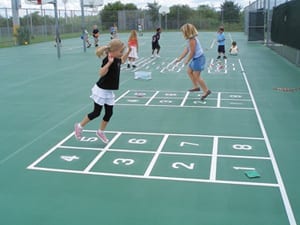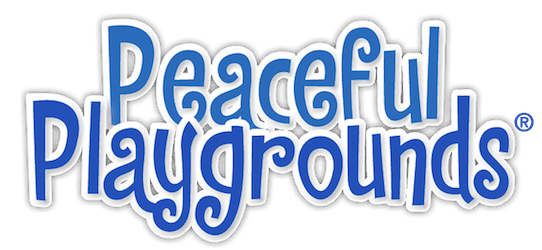By Darlene Pellechia
Naples Daily News
October 2007
 Remember hop scotch, four-square and leap frog? These games of yesteryear are making a comeback on the playground at Osceola Elementary School thanks to a program called Peaceful Playgrounds, part of the school’s Positive Behavior Support Process.
Remember hop scotch, four-square and leap frog? These games of yesteryear are making a comeback on the playground at Osceola Elementary School thanks to a program called Peaceful Playgrounds, part of the school’s Positive Behavior Support Process.
According to Osceola Asst. Principal Tammie Stewart, the concept is to promote positive behavior and provide students with ways to intervene and/or avoid inappropriate behavior.
“We need to teach our students to be proactive, not reactive,” she explains.
Osceola has been a Positive Behavior Support model school for two years and one of only 56 schools, statewide, to use the process. Stewart says it works. In just one year, behavioral referrals decreased from 587 to 187, in a school with 900 students.
Spurred on by the success of the PBS program, school administrators began to look into Peaceful Playgrounds, after a staff member brought it to their attention, last spring.
The concept is delightfully simple and something many grandparents have been touting for years – give kids some organized games to play.
“It provides a number of activities resulting in fewer conflicts and reduced playground injury, while motivating students to be physically active,” Stewart explains. “We worked on it over the summer and felt it was something positive for our school.”
The program is based on five components:
- Marking the playground. Instead of students having to draw the grids in the sand or use chalk on a sidewalk, the district’s maintenance department painted permanent numbers, letters, boards and grids on the school’s hard court using stencils.
- Consistent rules. Games are introduced in P.E. and health classes so students understand the rules and how they are played. Activity guides by age level provide recommendations for dozens of games and activities to encourage continued use by all ages of students. The program also includes certificates and rewards for good sportsmanship.
- Equipment. The kit includes color coded equipment such as balls, beanbags, Frisbees, hoops and nets used to implement the games.
- Conflict resolution. In addition to discussing the games and rules in P.E. class, signs and posters are placed in all classrooms to remind students of game rules and how to resolve disagreements during play.
- Consistent expectations. To ensure success, every staff member is thoroughly familiar with all five components of the program through workshops and video tapes to assist with staff and student training.
Osceola secured funding for the program through a “safe and drug-free schools grant” and from donations provided by Sam’s Club. The program is used at recess, after school and can also be used in the regular classroom.
“The options include traditional games like tether ball and hop scotch and the students love it,” Stewart says of the program’s success.
The California School Boards Association honored Peaceful Playgrounds with a Golden Bell Award. Peaceful Playgrounds also received the American Association for Leisure and Recreation Friend of Recreation Award.
While the Peaceful Playgrounds program has been used in over 8,000 schools and park districts throughout the country, Osceola Elementary is the first among Collier’s public schools to utilize it.
“Our goal is to promote healthy, educational, purposeful play,” Stewart says. “We want to promote positive behavior and active learning.”

